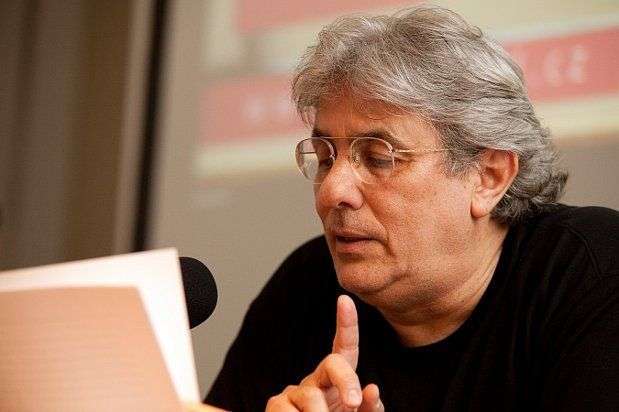Solemn acts usually arrive late and obey rather to situational circumstances. Some other times it is not like that. And in the second group is the day that the Luis Cernuda Chair of Seville paid just homage to the formidable Cuban writer living in Barcelona, Abilio Estévez.
The first sign that Seville people did things right is in the fact that the author accepted the homage. Abilio is allergic to rhetoric; he works and lives back to political opportunism or aesthetic of different sign.
As usual, in the comments on the literary festival in Seville it was said Estevez is a playwright but in passing and without mentioning any of his titles. I always resent the “homing” of the drama in the pantry of literature, but I will not waste time to complain and then remind the reader that this is one of the four fundamental playwrights in the Cuban theater.
Estevez was spared these minor and imperfect works that are usually at the beginning of most of the authors. In 1984 he won the UNEAC award with La verdadera culpa de Juan Clemente Zenea.. This, along Estorino’s appropriation of the figure and work of Milanes, is the highest moment of a trend of dramatic literature of the last decades of the last century. Searching in poets and the word was a way to escape the tendency to speak of this with remnants of that Soviet “production dramaturgy”. It was coherent that it had to Estorino who take to the stage what Gilda Santana, in a magazine called Tablas “his most imaginative, ambitious and mature staging “.
Abilio has managed to talk with his teachers. With Virgilio Piñera you find an exemplary and rare case of generational exchange and personal friendship. Several of the last poems of Virgil are dedicated to Estevez and the latter left the best evidence of that last decade of life Piñera in which the unspeakable silence that couldn’t overcame creative tenacity was sentenced to civic death,.
La verdadera culpa… seems to fulfill a Lezama mandate, reachable in La cantidad hechizada: “Sometimes I think about the trial and execution of Zenea as a possible great work for the theater of the future”.
Perla Marina is based on the classic poem by Piñera “La isla en peso”. In this excellent work as in Un sueño feliz or the spectacular monologues Santa Cecilia and El enano en la botella, Estevez quotes, parodies, you could almost say kisses fragments of the best of our poetry, songs, customs, food, gestures, aspirations of the Cuban culture. La Noche – winner of Tirso de Molina award, the highest honor in Spanish speaking theater, meant a lesson of universality and grandeur that the Havana audience applauded and shared during the hardest days of the nineties.
I say goodbye by remembering Roberto Blanco- key figure in Cuba stage direction that was able to connect the writer with the man of the theater in which he was becoming-with discretion and timidity, but not without fervor-Abilio Estevez. Of the many memories and names that have to do with the work of Estevez on stage I prefer the appropriation of La Noche by Raul Alfonso, with the grace Walfrido Serrano in Perla Marina – only memorable staging by actor Robert Bertrand-, the premiere of Santa Cecilia, by Vivian Acosta (directed by José González) and the appropriation of that character by Osvaldo Doimeadiós directed by Carlos Diaz, the grace and naturalness of El enano en la botella in the skin of Gretel Trujillo, led by Raúl Martín. And, as the curtain falls, a few words from Un sueño feliz having to do with the literary and ethical lesson of Abilio Estévez: “the only thing contrary to nature is hatred.”










